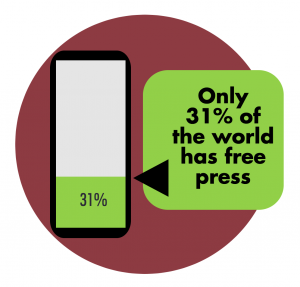Freedom of Press
“A free press is fundamental to a democratic society. It seeks out and circulates news, information, ideas, comments and opinions and holds those in authority to account. The press provides the platform for a multiplicity of voices to be heard. At national, regional and local level, it is the public’s watchdog, activist and guardian as well as educator, entertainer and contemporary chronicler” (1).

Media is the way we as citizens hear about the ongoings of the world: newspaper, tv, radio, and social media to name the biggest. In an ideal world, these platforms should be free for users and writers to express themselves. In addition, news outlets should be free to broadcast the stories that they feel are important and that they believe in. However, in today’s world, this is not the case. “Worldwide, several social and economic trends are stressing democracies… and democratic institutions — such as the courts or a free press — have weakened in many developing and post-communist countries where conditions needed to sustain democracy are relatively weak” (2). Outside parties whether it be political, religious, or military groups across the globe have surprisingly high amounts of influence on the press and the news. they are oppressing the people, denying them of a platform where all voices can be heard. It is a human right to be able to express yourself freely, including expression of those ideas through the media.
In China, a country who’s media is largely monitored by the current government, stories don’t get published if they don’t abide by party beliefs. According to Freedomhouse.org, “Xi Jinping, the state president and leader of the Chinese Communist Party (CCP), made high-profile visits… to key state media outlets and called for all media to demonstrate strict adherence to the party line” (3).
Why would a government want to intervene with their media? The answer is simple; they benefit from the oppression of others and their deprival of freedom of speech through the media. There is immense power in the everyday citizen who, when banded together, can change the world. By not allowing these voices to be heard and monitoring what they see, this power is diminished.
Countries like Sweden, Norway, and New Zealand enjoy the most freedom of press and are some of the most democratic nations in the world. However, even in a region of extreme suppression of the media, news outlets that support free speech like Al-Jeezera prevail. Al-Jeezera is unaffiliated with a country and primarily broadcasts news regarding the middle east and Africa across the world. The news outlet has educated and inspired citizens all across the middle east to fight for their own free press and band together.
What is different about freedom of press in comparison to gaining freedom by citizenship or court rulings is that the government should not be involved. Truly free press has no place for interference from governments, businesses, militia or religious groups. However, free press is not inherently against the government, but in countries where it is suppressed, it typically is. Each path to freedom involves a multitude of factors; for example, freedom may or may not involve the government. It may require a mass of people, or maybe only one. It may take decades, or just days.
Click here to view an up to date interactive map that depicts free press around the world.
Sources
(1)- “Press Freedom, Why Is It Important?” Press Freedom – Journalists and Freedom of Speech, www.newsmediauk.org/Current-Topics/Press-Freedom.
(2)- Sataline, Suzanne. “Democracy Under Stress .” CQpress, 20 Oct. 2017, library.cqpress.com/cqresearcher/document.php?id.
(3)- “China Profile.” China, Country Report, Freedom of the Press 2017, 19 Sept. 2017, freedomhouse.org/report/freedom-press/2017/china.